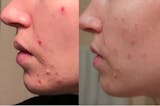Certain foods can trigger eczema symptoms by impacting the immune system and skin health.
Once a dietary factor is recognized as a factor in eczema, adjustments can be made to manage symptoms.
Eczema is a chronic skin condition characterized by periodic acute flares, marked by red, itchy, and inflamed skin. The severity and duration of an acute eczema flare are influenced by three main factors:
While there are many things that affect these factors, research has shown that diet can play a significant role in all three factors.
In this blog post, we will explore the connection between eczema and diet in detail, including which foods can trigger eczema symptoms, how to tell if your eczema is diet-driven, and what an eczema-friendly diet looks like.
By the end of this post, you'll have a better understanding of how your diet can impact your eczema and what you can do to manage it effectively.
JUMP TO SECTION:
How food and drinks can trigger eczema flare-ups
Research has shown that certain foods and drinks can trigger eczema symptoms by affecting various aspects of the body's immune system and skin health. Understanding the mechanisms can help to identify what is going on and therefore what dietary changes need to be implemented.
Dietary Allergies
When someone has a weak skin barrier and an allergy to certain foods, consuming these foods can trigger eczema flare-ups. The body perceives the allergen as a threat and reacts by releasing histamine and other inflammatory molecules.
If the inflammatory response is strong enough, it becomes systemic and travels to the skin, where a weakened skin barrier is affected, resulting in itching, redness, and inflammation. For more information, see our article on allergies.
Gut Permeability
The gut lining is the interface between your body and the foods you eat. It must absorb the nutrients you rely on for survival while preventing toxic substances and pathogens from entering the body.
Leaky gut occurs when the intestinal tract is damaged, allowing undesirable matter to enter the body.(IMU 2020) This can trigger an immune response that becomes systemic, and combined with a weakened skin barrier, an eczema flare can occur.(APA 2023)(CLA 2016)(HHP)(FIS 2012)
Chemical Load
Processed foods and drinks often contain artificial ingredients and preservatives that can be harmful to the body. These chemicals can trigger an immune response, leading to eczema flare-ups.
Preservatives such as nitrates and sulfites are used in foods to prevent microbial growth and extend their shelf life. They can induce dermatitis and hives, among several other health conditions.(VAL 2012)
Liver Toxicity
The liver plays a vital role in filtering toxins from the body, but when it becomes overburdened with toxins, it can't function properly. This can lead to inflammation and other health problems, including eczema.
Fat Metabolism
Fat metabolism plays a crucial role in maintaining skin health, and any disruption in this process can contribute to skin issues, including eczema.
High levels of omega-6 fats in the blood have been linked to the onset of eczema.(FIS 2012) Modern western diets tend to be rich in omega-6 fats, which are commonly found in vegetable oils, processed foods, and some nuts and seeds. On the other hand, these diets are often lacking in omega-3 fats, which are found in fatty fish, flaxseeds, and walnuts. Omega-3 fats have anti-inflammatory properties, which can help counteract the pro-inflammatory effects of omega-6 fats.
Trans fats, found in some processed foods and partially hydrogenated oils, are another type of fat that can negatively affect eczema. These highly reactive fats can interfere with enzymes in the body, disrupting the healthy balance of essential fatty acids and contributing to inflammation. Limiting or eliminating trans fats from your diet can help improve eczema symptoms and overall skin health.
Additionally, a high intake of saturated fats can influence hormone levels, which can, in turn, lead to eczema flare-ups. Saturated fats are typically found in animal products such as meat, butter, and full-fat dairy, as well as some plant-based oils like coconut oil and palm oil. Reducing saturated fat intake and opting for healthier sources of fats, such as olive oil, avocados, and nuts, can contribute to better hormone balance and improved eczema management.
Which Foods Trigger Eczema?
Certain foods and drinks have been identified as common triggers for eczema symptoms. In part, that is because an allergy or intolerance to that food is associated with the mutations in the body that lead to a weak skin barrier.
It's important to note that not all individuals with eczema will have the same food triggers, and some may not have any food triggers at all. However, by identifying and avoiding potential food triggers, individuals can reduce the frequency and severity of eczema flare-ups.
Dairy
Dairy products, such as milk, cheese, and yogurt, contain lactose which more than 40% of eczema sufferers are sensitive to.(FIS 2012) If an individual is iron deficient, dairy has been shown to damage the gut lining and contribute towards leaky gut.(FIS 2012)
However, consumption of dairy products such as milk, yogurt and kefir (a fermented yogurt) has been shown to improve the gut microbiome.(ASL 2020) If there is no sensitivity to dairy, it can be beneficial to consume dairy products.
Fermented Foods
Some fermented foods can be high in histamines.(FIS 2012) In the body, histamines lead to itchiness and redness among other things.
Gluten
Gluten is a protein found in grains such as wheat, barley, and rye. For some people, gluten can trigger an immune response and lead to eczema symptoms. In others, consumption of glutenous foods increases gut permeability.(KHO 2020)
Sugar
Sugar, when contained within a fiber matrix (like a raw apple), is not in itself bad. Processed foods, or refined products like apple sauce or juice, contain “free sugar” which is outside a fiber matrix.
Sugar when consumed outside of fiber is associated with inflammation and liver disease.(KHO 2020)(MA 2022)
Sugar can also break down collagen, one of the building blocks of healthy skin.
Additionally, sugar and artificial sweeteners can disrupt gut health and contribute to the growth of harmful bacteria leading to systemic inflammation.
Other Common Food Triggers
Other common food allergens, such as eggs, soy, and nuts, can trigger eczema symptoms in some individuals. Nightshade vegetables, such as tomatoes and eggplants, and spicy foods may also trigger eczema symptoms. Brewers yeast has been shown to flare eczema.(FIS 2012)
Highly Acidifying foods |
Highly acidic foods disrupt your bodies pH. Excess acid is excreted through skin, lungs and kidneys. |
Fermented foods |
Increases chemical load – has been shown to worsen eczema symptoms |
Nitrates |
Eczema sufferers can be sensitive to dietary nitrates – used as a preservative |
MSG |
Promotes liver inflammation and has been shown to worsen eczema symptoms |
Histamine |
A chemical which is produce by the body during an allergic reaction is also naturally available in the diet – See Antihistamine section for more. |
Brewer’s Yeast |
Has been shown to worsen eczema symptoms |
Food Additives |
Preservatives, artificial coloring, artificial sweeteners |
(FIS 2012)(COM 2020)
Dietary sulfites have been shown to induce dermatitis and hives, among several other health conditions.(VAL 2012)
For more information, check out our allergies and intolerances page.
Alcohol & Eczema
Alcohol consumption can have a negative impact on eczema symptoms due to its dehydrating effects on the body, influence on blood vessels, and its potential to damage the gut lining. Furthermore, alcohol can cause liver stress and interact with other dietary factors to exacerbate eczema symptoms.
When alcohol is consumed, it can lead to dehydration, which can worsen eczema symptoms. Adequate hydration is crucial for maintaining healthy skin, and dehydration can result in dry, itchy, and irritated skin. Additionally, alcohol can cause blood vessels to dilate, leading to flushing and skin irritation. To minimize these effects, it's important to drink plenty of water and stay well-hydrated, especially when consuming alcohol.
Alcohol consumption can damage the gut lining, contributing to leaky gut syndrome. As the gut lining becomes more permeable, it allows undesirable substances to enter the bloodstream, triggering an immune response and exacerbating eczema symptoms. Furthermore, since alcohol is a fermented product, it can contain high concentrations of histamines, which can be problematic for individuals with histamine intolerance. To protect gut health, consider reducing alcohol intake and focusing on a diet rich in gut-friendly foods, such as probiotics and fiber.
Alcohol is essentially a toxin, and its consumption puts stress on the liver as it works to metabolize and eliminate it from the body. Some individuals have an intolerance to alcohol, making it even more difficult for their bodies to process it and putting additional stress on the liver.
When alcohol is consumed alongside processed foods, the liver becomes overstressed, leading to a stronger inflammatory response and exacerbation of eczema symptoms. To reduce liver stress, consider limiting alcohol consumption and avoiding processed foods.
Hydration & Eczema
Individuals with eczema often experience a weakened skin barrier, which can result in increased transepidermal water loss (TEWL). This water loss can contribute to dry, itchy, and irritated skin, which can exacerbate eczema symptoms.
Repairing the skin barrier requires moisture. Adequate water intake can support the skin's natural repair processes and promote overall skin health.
How Can I Tell If My Eczema is Driven by Diet?
Determining whether your eczema is diet-driven can be a challenging task. However, by utilizing specific tools and techniques, you can identify if certain foods may be contributing to your symptoms.
Here are some strategies to help you determine if your eczema is influenced by your diet:
Food Journaling
Keeping a food journal can help you track which foods you consume and when eczema symptoms occur. This can help you identify potential food triggers that may be exacerbating your symptoms.
Generally, symptoms increasing may be related to the food consumed up to 48 hours prior.
Allergy Testing
If you suspect that you may have a food allergy, allergy testing can help you determine which foods you should avoid. Allergy testing can be done through blood tests, skin tests, or elimination diets.
Elimination Diet
An elimination diet involves removing potential food triggers from your diet for a period of time, then gradually reintroducing them one by one to determine which ones are causing eczema symptoms.
I Am Convinced Diet Is a Factor, What Can I Do?
From recognizing foods that can trigger flare-ups to incorporating foods that can help soothe symptoms, the role of diet in eczema management cannot be overstated. Remember, everyone's body is unique, and what works for one person might not work for another.
Please take a look at our diet and nutrition page for how to leverage diet in alleviating eczema symptoms.
Learning More About Eczema Triggers
It is crucial to remember that eczema is a multifactorial condition. Diet is just one of the many factors that can contribute to its development and exacerbation.
We encourage you to explore other factors and treatments by engaging with our other content, as a comprehensive approach is key to effectively managing this complex skin condition.
Share your experiences with us! Tell us what has and hasn’t worked for you. What did we miss in this article that you've found personally impactful? Your insights can help others better understand and manage their eczema.



